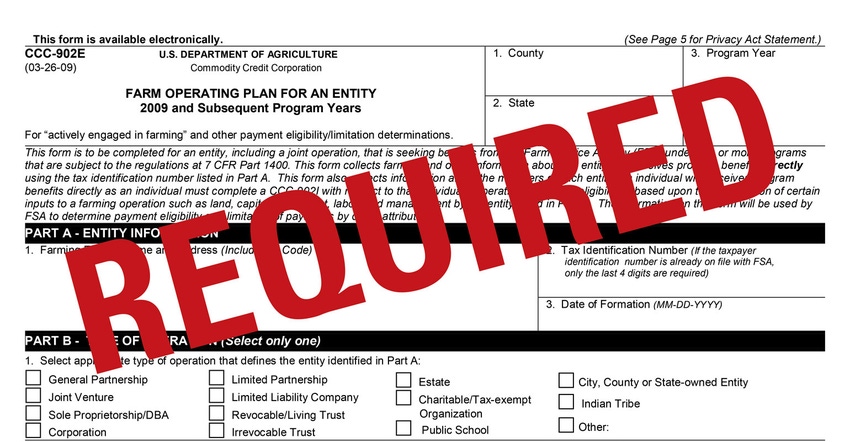
Farmers or landowners participating in USDA’s Natural Resources Conservation Service programs have a new required form to fill out.
The Farm Service Agency may be reaching out by mail with information about the CCC-902 Farm Operating Plan form. Starting this year, all producers and landowners participating or applying to participate in certain NRCS programs must complete the Farm Operating Plan.
Historically, to participate in these programs, farmers and landowners could choose between filing either the CCC-901, Member Information or the CCC-902. Now, to ensure FSA and NRCS are properly determining payment eligibility and maximum payment limitations, all customers must have a CCC-902 on file to establish eligibility.
FSA notes these changes will not affect participants who already have a CCC-902 with a “determined” status recorded with FSA. Customers who do not have a CCC-902 on file with FSA will be sent a letter in the mail in the coming weeks with detailed information on what is needed and how to file the form. The letter requests that the form be completed within 30 days.
For added convenience, USDA is offering options for remote or in-person submission of CCC-902. Fiscal 2021 is considered a transition year to ensure all NRCS program participants can meet this updated filing requirement.
Beginning in fiscal 2022, if form CCC-902 is not on file, your payments may be affected.
Missouri Steer Feedout accepting entries
Cattle producers can enter the next Missouri Steer Feedout through Oct. 10, with weigh-in on Nov. 2.
Eldon Cole, University of Missouri Extension livestock specialist, explains how the program works. It consists of five or more head of steers born after Jan. 1, 2021. At delivery, they should be weaned at least 45 days, weigh more than 500 pounds, be dehorned, castrated and healed, and have had two rounds of modified live vaccines.
The usual pickup locations are in northeastern Missouri at the Paris Veterinary Clinic in Monroe County and in southwestern Missouri at Joplin Regional Stockyards near Carthage. After weigh-in, Missouri Department of Agriculture graders evaluate and price steers. Pricing helps at the end of the feedout when profitability is calculated, Cole says.
After the weigh-in, the steers are sent to a feedlot in southwestern Iowa as part of the Tri-County Steer Carcass Futurity. Complete carcass data is gathered at a Tyson Foods plant in Dakota City, Neb.
Tri-County Steer Carcass Futurity officials combine the set-in price, feedlot performance and carcass value to find out which steers were the most profitable during the finishing phase. This helps participants make decisions about breeding stock and whether to retain ownership.
Farmers pay the $20-per-head entry fee by Oct. 10. There are no periodic feed bills, as all expenses are deducted from the final check. Those who send 10 or more steers may ask for a cash advance once the steers arrive in Iowa. The advance cannot exceed 50% of the initial market value of the cattle.
To find out more, download a brochure or the entry form.
Farmer makes prairie priority
Mark Belwood of Marshall, Mo., was awarded the 2021 Clair L. Kucera Prairie Landowner of the Year Award by the Missouri Prairie Foundation.
Belwood is a famer who owns hundreds of acres of row crops, as well as nearly 60 acres of diverse prairie plantings, wooded acres and a small glade. He established buffer strips of prairie plants along some of his row crops that provide pollinator and wildlife habitat, and reduce runoff and erosion. He controls invasive plants and manages his glade to protect its special biological attributes. Belwood also uses his farm as an educational tool to help others learn about his prairie plantings.
For instance, he hosted the Missouri Prairie Foundation’s Prairie Eclipse Party in 2017 and provided tours of his plantings. According to the Missouri Prairie Foundation, Belwood “never stops learning about prairie ecology and applies what he learns to make his plantings and glade as well managed as possible.”
About the Author(s)
You May Also Like






